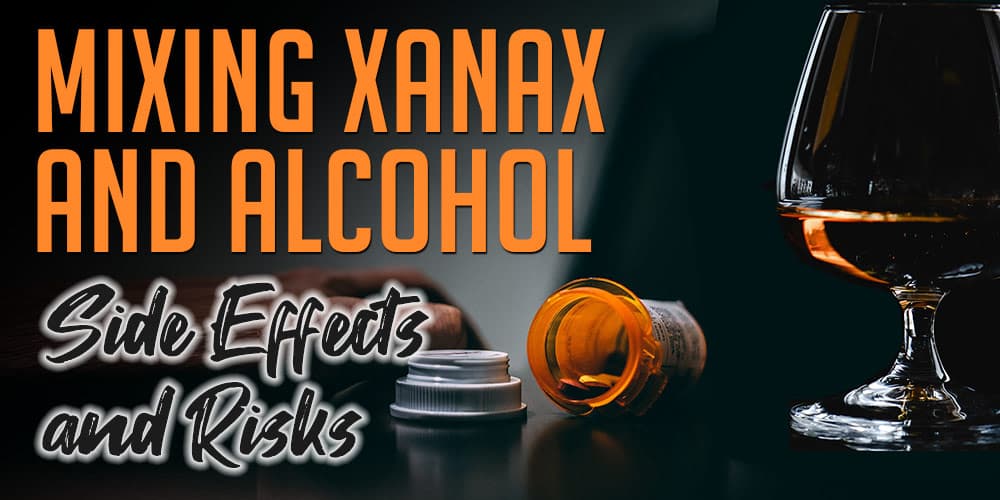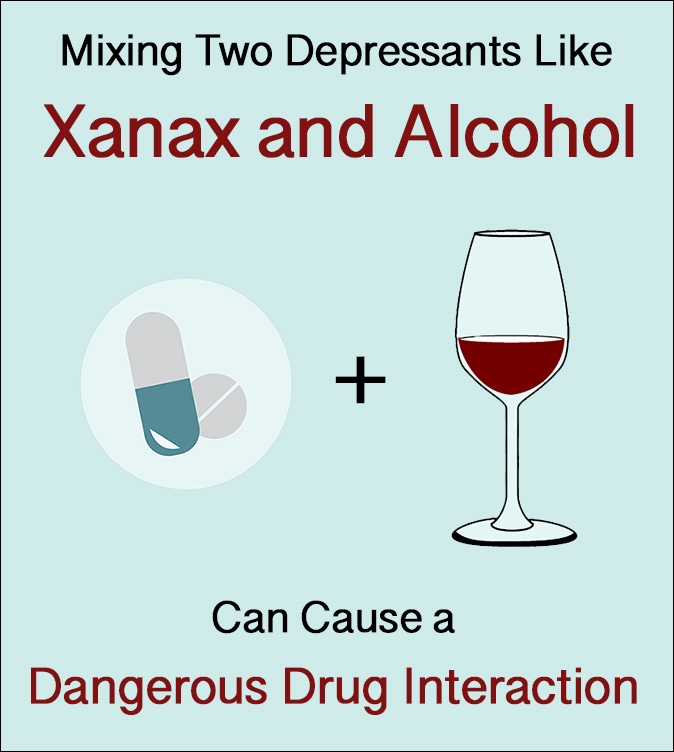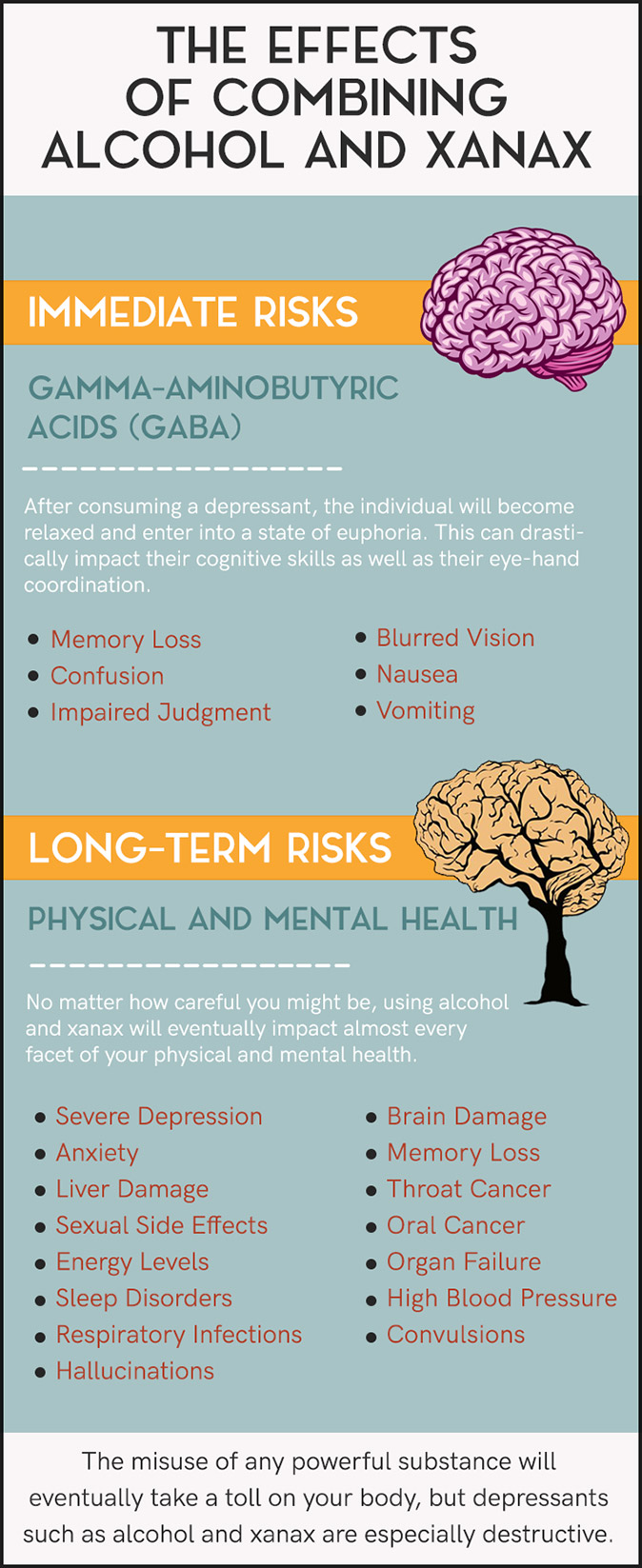
Misusing any substances like drugs or alcohol will eventually take a toll on the body, but mixing two depressants together like Xanax and alcohol can be especially dangerous.
When these two substances are combined, it can result in serious health complications ranging from liver damage to an accidental overdose.
Anyone who is struggling with an addiction to Xanax and alcohol together should understand the side effects and health risks and seek professional help.
Over time, an addiction to these substances will only become worse, so getting treatment early offers the best chance for a successful recovery.
Xanax and Alcohol are Both Depressants
Depressants are a type of drug that serve an important role in medicine when used properly as prescribed by a doctor. But these drugs can also cause serious health issues when misused or abused.
Medications like depressants are often prescribed to reduce anxiety, improve sleep, prevent seizures, and even relax the muscles.
Xanax (alprazolam) is a common depressant that belongs to the class of drugs known as benzodiazepines. Anyone who has ever been prescribed benzos understands they are a type of depressant.
On the other hand, many people don’t realize that alcohol is also a depressant.
While the term “depressant” sounds as if it would make a person depressed, in reality, these types of substances actually have a calming effect on the nervous system, which is why people feel relaxed when using them.
Soon after taking a depressant medication or drinking alcohol, an individual’s heart rate and breathing will slow down, as well as other bodily functions.
When depressants such as alcohol and Xanax are taken together, the calming effect on the body is amplified and it can cause a number of unhealthy conditions including difficulty breathing, seizures, or cardiac arrest.
Mixing Depressants Like Alcohol and Xanax
Depressants are often prescribed to patients who are dealing with issues such as chronic anxiety and depression. While they are very effective on their own, combining depressants can be risky.
When alcohol and Xanax are taken together, especially in large quantities, there is a chance that an individual’s breathing or heart rate will drop so low it causes cardiac arrest.
There are a number of reasons why people use alcohol and Xanax together. Some simply don’t know they can cause a dangerous drug interaction, while others do it recreationally for the high it produces.
In certain circumstances, a person will intentionally take these two substances together in order to heighten the effects. This might happen when an individual is prescribed Xanax, but he or she no longer feels it is working as intended because they have developed a tolerance to the medication.
Others take Xanax and alcohol together to intensify or speed up the feeling of being intoxicated.
Whatever the reason for mixing them, it is unsafe to take them together and never recommended because it could cause a dangerous drug interaction.

Immediate Side Effects of Depressants
Benzodiazepine depressants like Xanax affect a group of neurotransmitters known as gamma-aminobutyric acids (GABA). GABA produces a calming effect within the brain.
Because alcohol is also a depressant, it has a similar affect on the brain and body.
After taking a depressant, an individual will become relaxed and sometimes enter a state of euphoria. This can impact cognitive skills and thinking, as well as hand-eye coordination.
The user may appear to be drunk or begin slurring his or her words or stumbling when walking.
Some people may become drowsy or even fall asleep.
Other side effects can include memory loss, confusion, impaired judgment, blurred vision, nausea, and vomiting.
Mixing two depressants like alcohol and Xanax is especially risky because the side effects are magnified, making it a dangerous combination.
Dangerous Side Effects of Xanax and Alcohol Together
Both alcohol and Xanax are addictive substances. Excessive or long-term use of each one by itself can cause a dependence that may lead to addiction. When taken together, the risks are compounded.
If a person misuses an addictive substance, he or she can develop a tolerance that requires a larger dose to feel the same effects as when they first started using it.
When this happens, it may eventually impact almost every aspect of a person’s physical and mental health.
Those who become dependent or addicted to depressants often struggle with mental health disorders like depression and anxiety.
There is a chance that substances like alcohol and Xanax will physically damage a person’s liver or other organs. Once the tissue of the liver has become damaged, it is nearly impossible for the body to filter out toxins and the condition is often not reversible.
Within a short period of time, depressants may also cause sleep disorders and other health issues.
Long-Term Side Effects of Xanax and Alcohol Use Include:
- Mental health issues like anxiety or depression
- Addiction
- Respiratory problems
- Functional and structural changes to the brain
- Memory loss
- Sleep problems
- Liver damage
- Seizures
- Withdrawal symptoms when trying to quit
Withdrawal symptoms can range from uncomfortable to fatal depending on the nature of the addiction.
Alcohol and benzos like Xanax can be extremely dangerous and difficult to quit and require a specialized detox program.

Treatment for Xanax and Alcohol Addiction
Trying to beat a Xanax addiction without professional help is not only difficult, but it can also be dangerous. Unlike many other types of substances, benzodiazepines and depressants have a major impact on the respiratory and central nervous system.
Alcohol can be just as difficult and dangerous to quit, specifically for those who have an excessive or prolonged history of alcohol use. For those who are unable to become sober on their own, an alcohol addiction treatment program offers the best chance for recovery.
Those who attempt to go “cold turkey” might experience serious side effects that can lead to severe health issues during withdrawal.
Others may find the withdrawal symptoms are too difficult and uncomfortable without medical supervision so they continue using alcohol and Xanax to avoid feeling so horrible.
These are just a few reasons why it’s necessary to consider professional help when attempting to recover from an addiction of any type.
Supervised Drug and Alcohol Detox
Depending on the severity of the addiction and length of time a person has been using the substances, a supervised detox program before rehab is usually advised.
An alcohol detox treatment program will work well for individuals who have only been using alcohol without any other substances.
This will keep the patient comfortable during the withdrawal phase to avoid serious complications like delirium tremens.
Xanax addiction can be more complex than alcohol and requires specialized treatment and detox because of the nature of benzodiazepines.
The safest and most effective treatment for benzo withdrawal and detox is the Ashton Method because it involves properly tapering usage of the drug to avoid the inherent risks quitting all at once.
After the detox process has been completed and the withdrawal symptoms have subsided, an individual should consider the most appropriate treatment options for recovery to avoid a relapse.
Addiction is a complex disease that includes many factors such as mental health disorders, past abuse or trauma, and an individual’s genetics. In order to fully recover from addiction, it’s necessary to identify and address all of the issues.
Individuals that were prescribed Xanax or other depressants for a mental health disorder will require a program that specializes in mental health.
But when a person has a mental health issue combined with an addiction to Xanax and alcohol, it is known as a co-occurring disorder.
A dual diagnosis rehab program is designed to treat both addiction and mental health conditions together at the same time.
Dual diagnosis treatment ensures that both addiction and mental health issues are addressed for a lasting recovery.
Seeking addiction treatment for substances like Xanax and alcohol may seem difficult for many people, but those who have recovered always say it changed their life for the better.
Related Posts
- Effects of Alcohol on the Body and Brain
Even though alcohol consumption is widely accepted in society, there are many negative side effects…
- Oxycodone Side Effects and Dependence or Addiction
What is Oxycodone? Oxycodone is an opioid drug, commonly known under the brand names Oxycontin…
- Side Effects of Marijuana
Understanding the side effects of marijuana is more important now than ever since its use…
